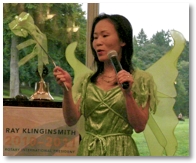
Dr. Alan Waltar
The speaker for the day was Dr. Alan Waltar, father of BBRC member Steve Waltar Esq., who recently retired as Senior Advisor to the Pacific Northwest National Laboratory (PNNL) in Richland, WA. He was previously Director of Nuclear Energy. He is a consultant to the IAEA and the US Department of Energy. He was Professor and Head of the Department of Nuclear Engineering atTexas A&M University from 1998 to 2002. He served as president of the American Nuclear Society from 1994 to 1995.
Dr. Waltar holds a B.S. in electrical engineering (University of Washington, 1961), an MS in nuclear engineering (MIT, 1962), and a PhD in engineering science (University of California, Berkeley, 1966).
His distinguished career with Westinghouse Hanford Company included leadership positions in several areas of advanced reactor technology. He served on the faculty at the University of Virginia where, with Professor Albert Reynolds, he co-authored the Fast Breeder Reactors textbook. Along with the Russian translation, this book has become one of the standard instructional books for fast spectrum reactors.
Dr. Waltar was instrumental in the formation of the World Nuclear University Summer Institute (SI) and has served as a mentor and member of the faculty at all six Summer Institutes in Idaho Falls, Stockholm, Daejeon, Ottawa,and two at Oxford.
Dr. Waltar authored America the Powerless: Facing Our Nuclear Energy Dilemma in 1995 and in 2004 published his newest book, Radiation and Modern Life: Fulfilling Marie Curie's Dream, which articulates the enormous beneficial uses of radiation to society.
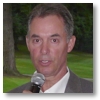
Bill Brooks makes the introduction.
The very distinguished guest began his talk by discussing the global energy scene. He explained that energy use is rising and will go higher as developing world advances. Two-thirds of the world population uses very little energy, but usage has been going up around the world consistently since 1945 and promises to continue at a rapid rate. In such a climate, nuclear energy has a very clear role in such issues as electricity for residential and industrial purposes, transportation (cars), desalination of water, process heat, and hydrogen production.
Dr. Waltar went on to discuss the major global drivers for nuclear expansion. Basic economics are at work, as existing fossil fuel supplies are being depleted and nuclear energy provides insurance against future fuel price increases. The prospect of carbon emission taxes and political pressures created by the global climate change issue makes nuclear energy an increasingly more economically attractive option. As a result, many countries such as Australia that do not have nuclear power are interested in developing nuclear plants. Waltar quipped, "I almost said there has been an explosion of nuclear activity, but that's not the right word." The club responded with grateful amusement.
Waltar pointed out that while nuclear accidents such as Three Mile Island and Chernobyl slowed interest for a long time, it is reviving. France, for example, now gets 75% of energy from nuclear power. France decided to go nuclear in the1970's during the oil embargo and never looked back, having recently announced plans for building new reactors. Finland is also currently building a new plant. Russia is doubling its nuclear energy production by 2020. The United Kingdom, Sweden, and Italy are all going back to Nuclear. China is planning for a five-fold increase in nuclear production with 24 plants under construction, while India is planning a hundred-fold increase by building six new plants. While the United States has many nuclear plants, only two plants (in Georgia) are in the initial stages of construction, and we are lagging behind other advanced nations.
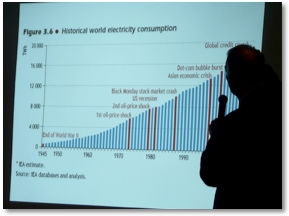
While the speaker was unquestionably in favor of the expansion of nuclear energy, he did not make his case unquestioningly. The challenges of nuclear energy were explained forthrightly, including the primary issue of safety. He pointed out the incident at Three Mile Island resulted in no deaths, and even the more serious problem at Chernobyl resulted in only 31 initial deaths. Other issues included, nuclear proliferation. The overall safety record of nuclear energy has been very good. Another question is the issue of nuclear weapons vs. civil programs.
"What about the waste?" Waltar asked rhetorically. Acknowledging that waste is the number one concern in the mind of the public, he stated that it is "almost an insignificant problem." "Hans Blix," he explained, "says the waste is an attribute of nuclear power. "Nuclear waste is so small compared to the waste of any other endeavor. Recycling would utilize over 95% of what we now call waste. Much of it can be employed in medical uses." He went on to add that Sweden is actually bidding for the waste sites. "They want it," he said. The Finnish site near Eurajokl will have a waste site attached to it to make the most of sequestering a valuable commodity.
In today's economy, the issue of cost is very important. Waltar noted that "this is still the biggest real concern." He recognized that the capital cost [of building facilities] is a problem, but once operating nuclear plants are built, they have lowest cost in the US apart from very cheap hydroelectric energy. He added that costs are coming down.
Another strength for nuclear energy is the skilled workforce that has emerged in the field. There is rising enrollment in nuclear engineering programs in the USA, and dozens of nations are participating in the World Nuclear University. All of the scientists know each other and are raising up new specialists together.
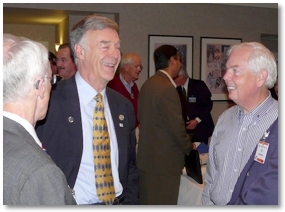
Alan Waltar talks with BBRC members Jim Gordon and Tom Helbling.
On the American scene, we have plateaued at 103 nuclear plants, but the energy output from the plants has been going up. Plant capacity has increased because we have gone from operating at about 60% of capacity to 90%. We know how to run the plants better now, and plants have been upgraded. Computers are more sophisticated now, allowing for more efficient operation. The equivalent of two dozen plants has been added through increased productivity of the existing plants.
In his most recent State of the Union address to Congress, President Obama called for a new generation of safe, clean nuclear power plants, and both sides of the aisles cheered. Presumably there is rising political support and strong public opinion in favor of nuclear energy, but according to Waltar, "we're still asleep. America slumbers." Rather than actually investing in nuclear energy, investors are pushing wind and solar energy, calling for a 50% base load from renewable sources. In his opinion, this is not realistic, and we are stalling the building of new nuclear plants. Solar and wind are intrinsically expensive because they are both very low density and are intermittent sources. Nevertheless, he said, "We are horrifically subsidizing wind and solar, and we cannot afford to do this endlessly."
Dr. Waltar concluded by remarking that "the first nuclear power era is over. We were the clear leader in this first era, but the leadership has been lost to Europe and Asia. We need to take the lead back."
Click here to download a PDF version of Dr. Waltar's presentation.
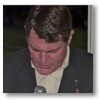







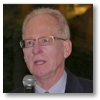
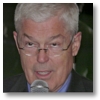

 John Dewater has again brewed a ton of bier and these girls can’t drink all of it! There will even be some surprise “special guest taps.” Make it to the Oktoberfest on Saturday, Oktober 16th, at 5:30PM, for bier, food, and fun! Oktoberfood prepared this year by our own BBQ kaiser, Chris Ballard!
John Dewater has again brewed a ton of bier and these girls can’t drink all of it! There will even be some surprise “special guest taps.” Make it to the Oktoberfest on Saturday, Oktober 16th, at 5:30PM, for bier, food, and fun! Oktoberfood prepared this year by our own BBQ kaiser, Chris Ballard!